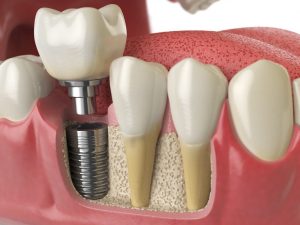 Modern dentistry has provided us with several ways to replace missing teeth, including bridges, dentures, and implants. When I talk to patients about these options, I often recommend dental implants in Camp Hill as the best way to replace a missing tooth. I do so because of the many benefits that implants offer.
Modern dentistry has provided us with several ways to replace missing teeth, including bridges, dentures, and implants. When I talk to patients about these options, I often recommend dental implants in Camp Hill as the best way to replace a missing tooth. I do so because of the many benefits that implants offer.
Implants Provide Whole-Tooth Replacement
Bridges and dentures simply replace a tooth’s crown — that is, the portion of the tooth that you normally see above the gums. An implant, on the other hand, is a small cylinder, usually made of titanium, that a skilled oral surgeon inserts in your jaw (a restoration goes on top of the implant). As you heal from the implant placement surgery, a process known as osseointegration takes places; your new bone is laid down directly on the implant surface and implant exhibits mechanical stability. This enables the implant to act similarly to a natural tooth root.
Modern dental implants have been used successfully for over 30 years. They are the strongest devices available to support replacement teeth. They allow these new teeth to look, feel and function like natural teeth.
When performed by an experienced Dentist and oral-maxiofacial surgeon, dental implants have become one of the safest and predictable procedures in dentistry.
Dental implants are the only dental restoration option that preserves natural (alveolar) bone, actually helping stimulate bone growth.
Replacing the root of the tooth as well as the crown offers a few significant benefits:
- After a tooth extraction, up to 25 percent of alveolar bone width may be lost within the first year. Following the first year, the bone loss continues but at a slower rate (the alveolar bone is the portion of the jaw that supports teeth). This occurs because there is no longer a tooth root to stimulate the flow of blood and nutrients to the bone. Because implants act like tooth roots, they have the potential to prevent this problem.
- Implants provide a very strong base for artificial teeth, meaning that their bite force is almost equal to that of natural teeth.
- Unlike a bridge, a single-tooth implant does not rely on adjacent teeth for support. Therefore, there is no need to replace an implant if one of the teeth near it begins to experience problems.
Implants Protect Your Natural Teeth
After a tooth is lost and the alveolar bone begins to resorb (shrink into the empty space), the surrounding teeth lose some of the support that keeps them in place. Therefore, they may begin to drift, moving slowly in the direction of the area where the tooth was lost. This issue of drifting may lead to malocclusion (a bad bite) that is uncomfortable for patients and may even lead to further tooth loss in the future. An implant can serve as a “placeholder,” keeping your natural teeth where they belong.
Another way in which implants protect natural teeth is that, unlike a bridge, that do not require that the adjacent teeth be filed down.
Implants: A Long-Lasting Solution for a Missing Tooth
On average, dentures may last for five to eight years before changes to the bone structure stop them from fitting well. A bridge may endure for 10 – 15 years or longer. However, implants’ unique bond with the body gives them the potential to last for a lifetime.
If you are interested in learning more about dental implants, I would be happy to consult with you. We can discuss whether you are a candidate for the procedure and what you can expect throughout your tooth replacement journey. I hope you choose an implant to replace your missing tooth so you can experience the best oral health possible.
About the Author
Dr. Rina Singh is one of the top dentists in Camp Hill. She enjoys building relationships with her patients and educating them about the treatments that can maintain and/or restore their oral health. If you have questions about dental implants, please contact our office at 717-761-0283.
